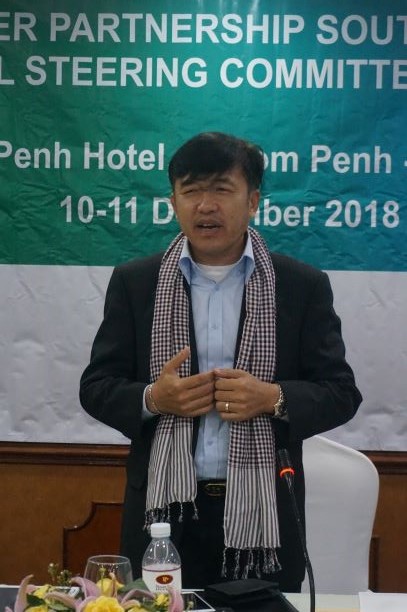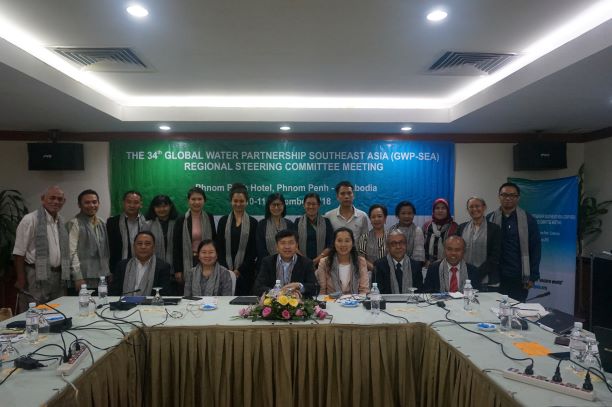The 34th Global Water Partnership Southeast Asia Regional Steering Committee Meeting was successfully held in Phom Penh – Cambodia, on 10-11 December 2018. As the on-going chairman, H.E. Mr. Watt Botkosal selected the location of meeting in Phnom Penh as a privilege of his chairmanship from the Cambodia.
The discussion was started on the follow up of the agreed 33rd Steering Committee meeting which was organized in Manila – Philippines in 2017. There were several priorities to discussed, among them are: the accreditation of Country Water Partnership, namely Cambodia WP, Thailand WP, and Lao-PDR WP; Locally raise fund; distribution of GWP’s seed fund; improvement of Operational and Capacity (OPCAP) status; and preparation of the new GWP-SEA chairman.

Photo: GWP SEA Chair H.E. Mr. Watt Botkosal gave final speech on the last activity he attended as the GWP-SEA chairman
For the accreditation, GWP-SEA managed to facilitate successful accreditation of Cambodia WP and Thailand WP. For Lao PDR WP, the accreditation is expected to be acquired during the 1st quarter of 2019. Following the achievement of accreditation target, GWP-SEA also managed to facilitate the improvement of the OPCAP status for all CWPs. Currently, Malaysia, Cambodia, Philippines, Indonesia and Viet Nam have achieved green status, which mean these CWPs can managed fund above 10.000 Euro. As for Myanmar and Thailand, the OPCAP status are still yellow due to the utilization of the accounting software. This yellow status means that CWP can manage fund up to 10.000 Euro. However, the status will be up-dated to green once GWP-SEA receives the proof of the utilization of accounting software, which was proven in the reporting of the Q4 2018 financial report. Accordingly, the status of Myanmar and Thailand WP should be upgraded to the green as well.
For Lao WP, the OPCAP status is still red due to accreditation sta-tus. The status of Lao PDR WP is expected to be yellow or green in the 1st quarter of 2019, once the accreditation status is granted by the GWPO.
Regarding the locally raised fund (LRF), there is a huge improve-ment where in 2017, Viet Nam, Philippines, and Malaysia raised substantial amount of LRF which then secured the full seed fund-ing from GWPO in 2018. And in 2019 itself, more CWPs are raising LRF, including Indonesia and Cambodia. It is expected in 2019, more LRF can be raised.
Focusing on 2019 planning and budgeting, it was discussed that the multi stakeholders platform both at country level and regional lev-el must be able to produce a significant contribution to ensure successful implementation of GWP’s mandate which is to facilitate the adoption and implementation of IWRM. Therefore, the discus-sion was centered around what would be the proper output of the multi stakeholders platform. In the discussion, the GWP-SEA secretariat proposed for each CWPs and regional water partnership to formulate at least two multi stakeholders position paper on priori-tized issues of IWRM in 2019. An example was brought up by the GWP-SEA secretariat on the "formulation of Multi stakeholders paper on the new Water Law Draft in Indonesia” in 2018.
Another important issue that was discussed on the performance evaluation of the multi stakeholders platform itself. This issue was related to the outcome challenge and progress marker formula-tion. It was agreed by all SC members that one way to evaluate the performance of multi stakeholder platform is to apply network mapping analysis where GWP-SEA and GWPO or the donor can see the strength of relationship between stakeholders that is improved due to facilitation of adoption and implementation of IWRM by each CWPs. The network analysis tool will be developed by GWP-SEA in consultation with GWPO and all CWPs.
Partners meeting to discuss the governance of the GWP-SEA is also another important issue that was discussed. It was proposed that this partners meeting should be organized back to back with 35th Regional Steering Committee Meeting. During this discussion, GWP-SEA secretariat also proposes to revisit the concept of the regional platform. The main issue here is for GWP-SEA to have its own regional partners while still maintaining the coordination with CWPs. Other issues such as statute revision, membership requirement and SC member selection will be included as the main issues to be discuss in the partners meeting.
The CWPs also had a chance to present their proposed activities for 2019 and to obtained input from each other. All the 2019 activities are based on the GWP-SEA 3-years work programme 2017-2019. Each activity is expected to be linked with the SDGs agenda, and other international agenda such as the International Water Association (IWA) agenda on connecting basin cities, Yangon Dec-laration, and Paris agreement on Climate Change.
On the Water and Climate Development Programme (WACDEP), GWP-SEA and all the CWPs are optimist to be able to continue the programme as each country has developed National WACDEP pro-ject document as the main reference for resource mobilization in each country. Furthermore, the reason PAN-ASIA technical workshop on Climate Change Project Proposal Development has created an opportunity to develop relation with National Development Authorities (NDAs), and Direct Access Entities (DAEs) that is expected to manifest in joint proposal development for water relat-ed adaptation projects.
Last but not least, the selection committee of the new chair for 2019-2021 presented the progress of the election process. More information from the three candidates were still required. It is expected the election process will be concluded in February 2019 followed by official hand-over from the on-going chair to the new chair. AW
